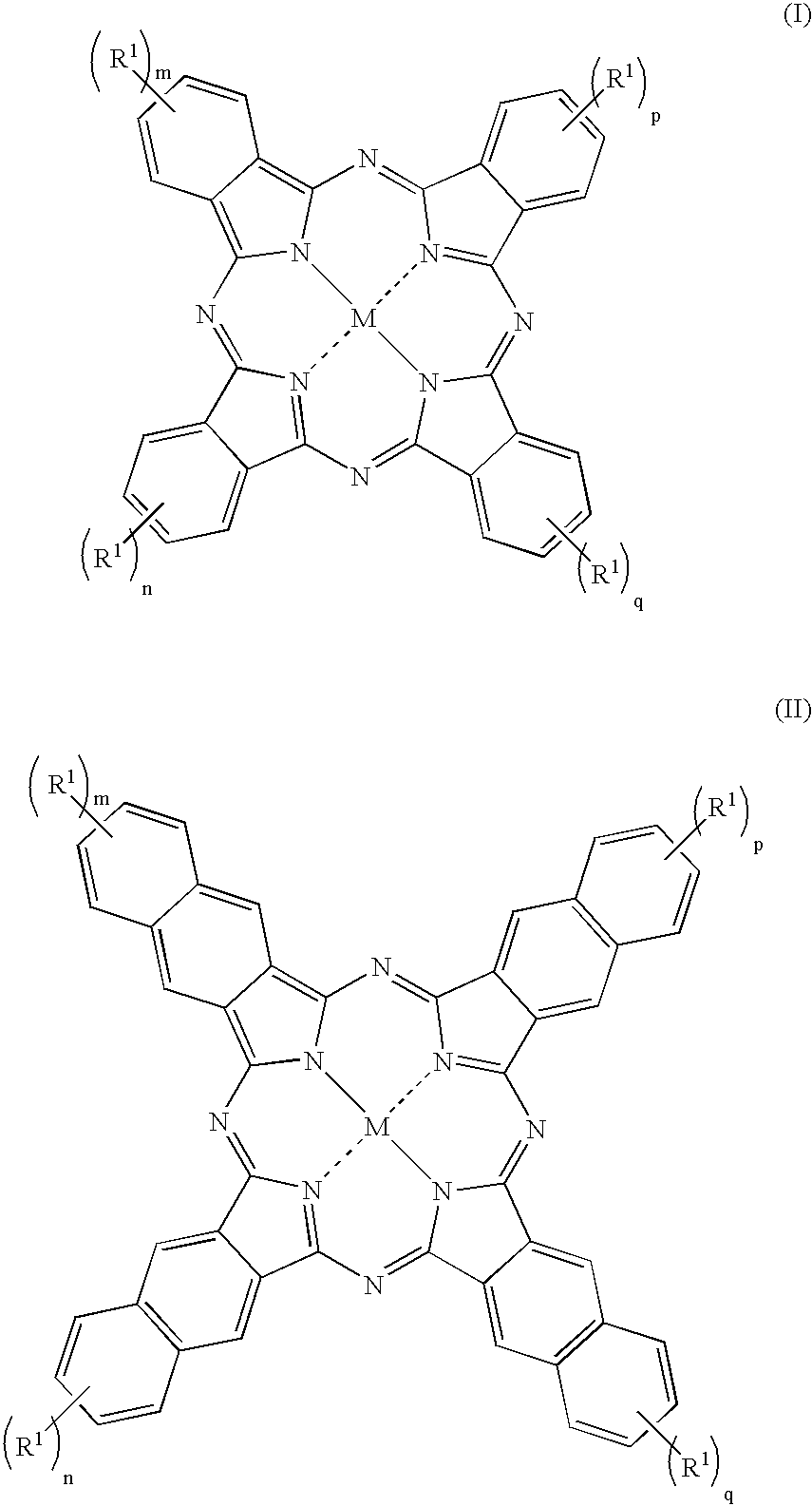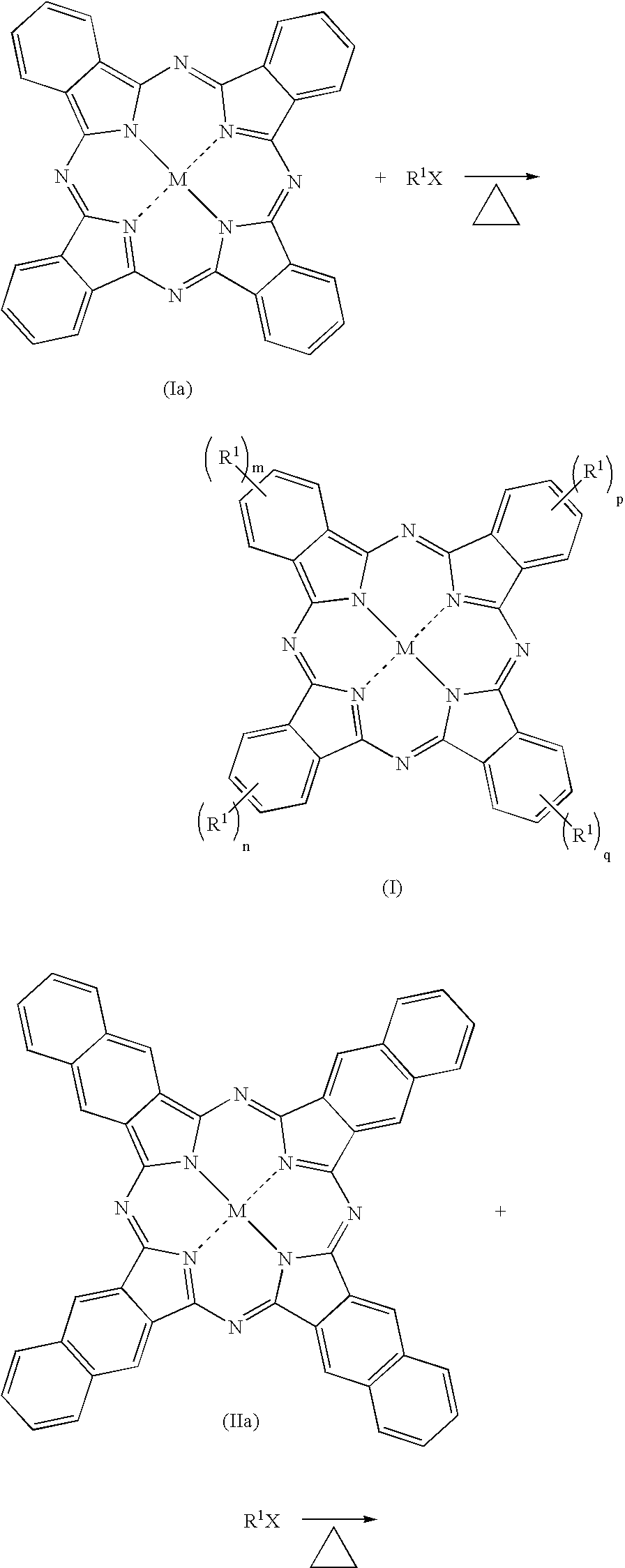Fluorinated dyes or colorants and their uses
a fluorinated dye and colorant technology, applied in the field of fluorinated dyes or colorants, can solve the problems of insufficient solubility, strong temperature dependence, and insoluble dyes or pigments that are not soluble in fluorinated solvents, and achieve high solubility or dispersibility, improve temperature latitude and switching performance, and improve the effect of solubility or dispersibility
- Summary
- Abstract
- Description
- Claims
- Application Information
AI Technical Summary
Benefits of technology
Problems solved by technology
Method used
Image
Examples
example 1.1
Preparation of Krytox® substituted Copper Phthalocyanine Dye (C3)
A mixture of copper phthalocyanine (1.4 gm, 2.4 mmole, Aldrich) and Krytox® iodide (16.32 gm, 9.6 mmole, DuPont) was added into a 72 mL pressure reactor (Parr Instrument Co.) with a glass liner. The reactor was vacuum sealed under 1 Torr and heated at 350° C. for 38 hours. The crude product obtained was extracted with 250 mL of PFS-2™ in a Soxhlet extractor for 1 day. The dark blue solution thus obtained was washed with 250 mL of acetone 3 times and evaporated to a slurry by rotary evaporation (60° C.) under vacuum (˜5 Torr) and then under high vacuum (˜1 Torr) overnight. The slurry compound was further purified by refluxing with ether (250 mL) for 1 day and the resulting mixture was separated. The dark blue slurry was again evaporated by rotary evaporation (60° C.) under vacuum (˜5 Torr) and then under high vacuum (˜1 Torr) overnight. A dark blue slurry compound was obtained (6.1 gm, 63% yield). UV-Vis (HT-200): λma...
example 1.2
Preparation of Krytox® substituted Copper Tetra-tert-butyl Phthalocyanine Dye (CB2)
1. Synthesis of Brominated Copper(II) 2,9,16,23-tetra-tert-butyl-29H,31H-Phthalocyanine
A mixture of copper(II) 2,9,16,23-tetra-tert-butyl-29H,31H-phthalocyanine (1.00 gm, 1.24 mmol, Aldrich) and N-bromosuccinimide (1.00 gm, 5.61 mmol, Aldrich) was stirred in a solution of trifluoroacetic acid (50 mL, Aldrich) and H2SO4 (15 mL, Fisher Scientific) at room temperature for 24 hours. The resulting dark blue solution was poured into 200 mL of ice water. The solid obtained was washed with water, removed by filtration and dried (60° C., 60 Torr) overnight. A dark blue solid (1.22 gm, 86%) was obtained.
2. Synthesis of Krytox® substituted Copper(II) tetra-tert-butyl-Phthalocyanine Dye (CB2)
A solution of 25 mL (11.25 mmole) of 9-borabicyclo[3.3.1]nonane (9-BBN) in 0.45-0.50 M of tetrahydrofuran was added dropwise to, under stirring, a solution of 4 gm of Krytox® ally ether (MW=1400) (2.85 mmol, DuPont) a...
example 1.3
Preparation of Krytox® substituted Copper tetrakis(4-cumylphenoxy)-Phthalocyanine Dye (CC1)
1. Synthesis of Brominated Copper(II) tetrakis(4-cumylphenoxy)-Phthalocyanine
A mixture of copper(II) tetrakis(4-cumylphenoxy)phthalocyanine (1.00 gm, 0.71 mmol, Aldrich) and N-bromosuccinimide (0.60 gm, 3.37 mmol, Aldrich) was stirred in a solution of trifluoro acetic acid (50 mL, Aldrich) and H2SO4 (15 mL, Fisher Scientific) at room temperature for 24 hours. The resulting dark blue solution was poured into 200 mL of ice water. The solid obtained was washed with water, removed by filtration and dried (60° C., 60 Torr) overnight. A dark blue solid (1.10 gm, 89%) was obtained.
2. Synthesis of Krytox® Substituted Copper tetrakis(4-cumylphenoxy)-Phthalocyanine Dye (CC1)
A solution of 25 mL (11.25 mmol) of 9-borabicyclo[3.3.1]nonane (9-BBN) in 0.45-0.50M of tetrahydrofuran was added dropwise to a stirring solution of 2 gm of Krytox® ally ether (MW=1100, 1.8 mmol, DuPont) and 10 mL of 1-(ethox...
PUM
 Login to View More
Login to View More Abstract
Description
Claims
Application Information
 Login to View More
Login to View More - R&D
- Intellectual Property
- Life Sciences
- Materials
- Tech Scout
- Unparalleled Data Quality
- Higher Quality Content
- 60% Fewer Hallucinations
Browse by: Latest US Patents, China's latest patents, Technical Efficacy Thesaurus, Application Domain, Technology Topic, Popular Technical Reports.
© 2025 PatSnap. All rights reserved.Legal|Privacy policy|Modern Slavery Act Transparency Statement|Sitemap|About US| Contact US: help@patsnap.com



